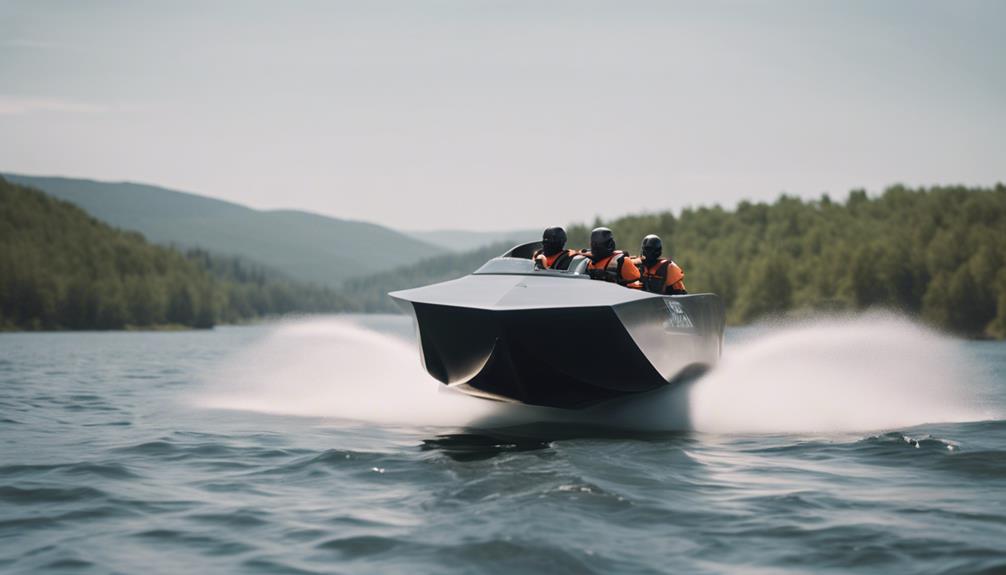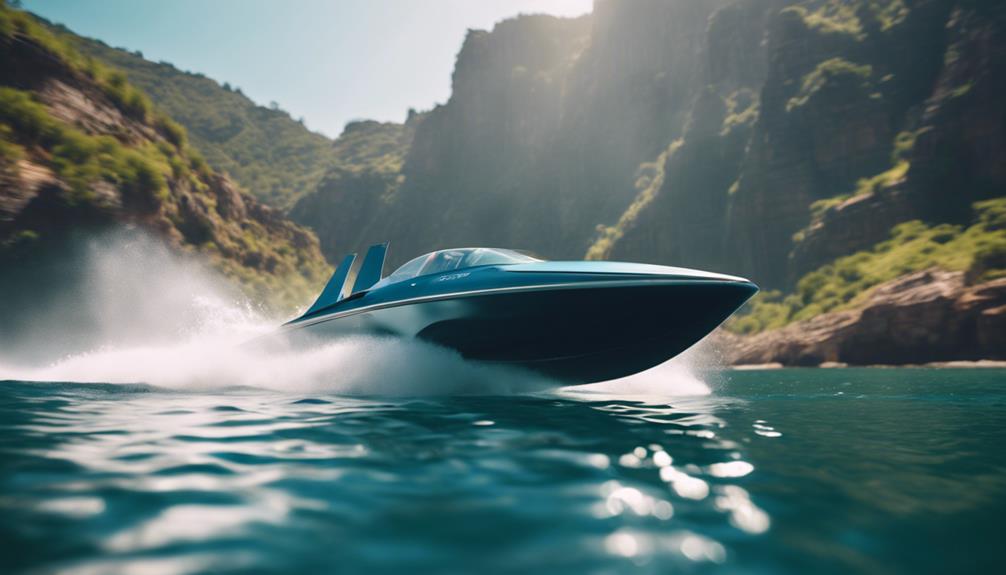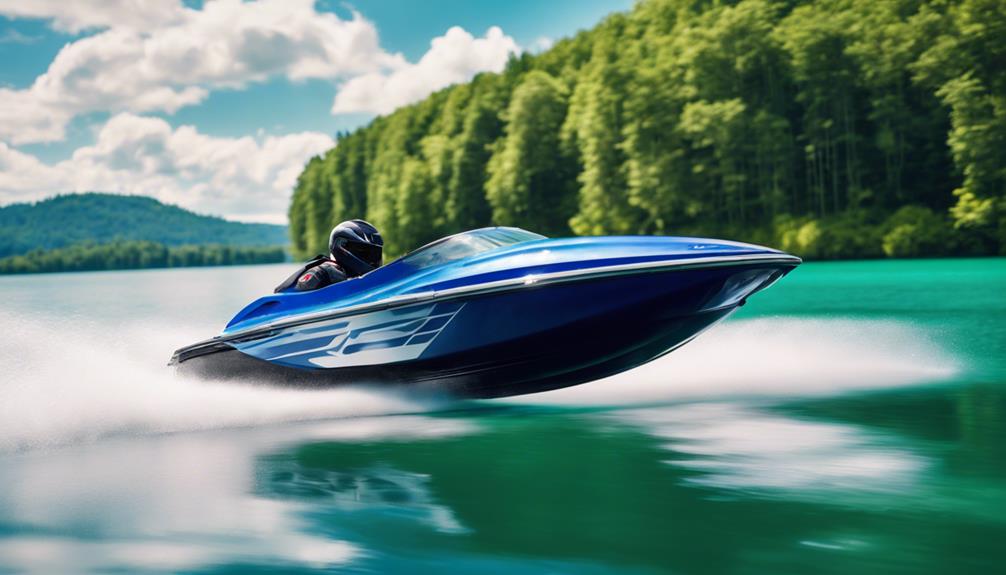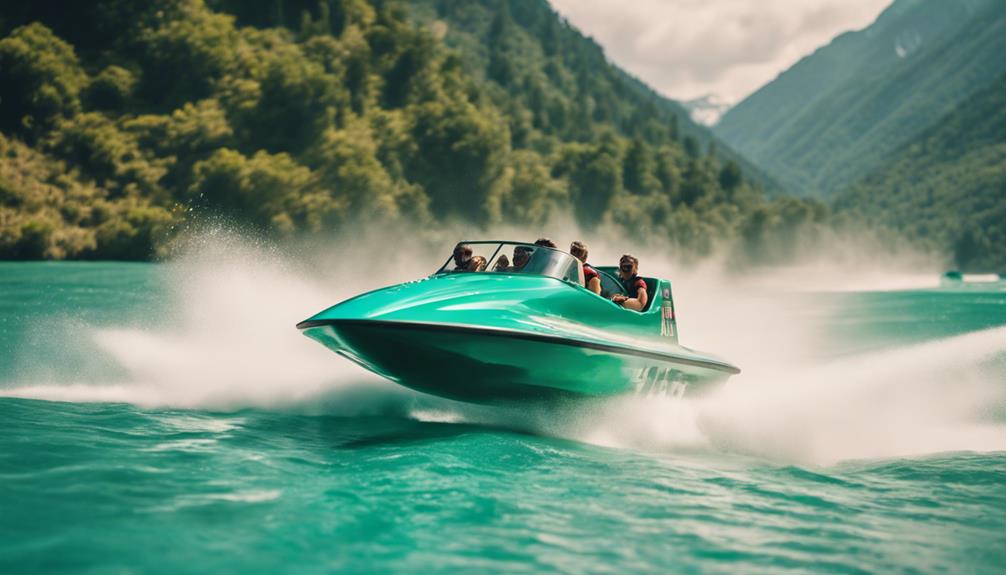Jet boats are generally reliable, offering impressive speed and maneuverability, but they come with specific maintenance needs. Their unique propulsion system provides excellent performance, especially in shallow waters. However, steering at low speeds can be challenging, and increased engine wear may occur if not properly maintained. Regular inspections and cleaning of the impeller system are essential to avoid performance issues. While they have safety features that reduce injury risks, understanding their nuances can prevent accidents. If you're looking to learn about performance advantages and maintenance tips, there's more to explore!
Key Takeaways
- Jet boats offer impressive acceleration and handling, making them reliable for thrill-seekers but challenging for inexperienced drivers at low speeds.
- Regular maintenance and inspections are crucial for jet boat reliability, as debris and engine wear can significantly affect performance over time.
- The absence of exposed propellers enhances safety, reducing injury risks for swimmers and during loading in shallow waters.
- Jet boats can consume significant fuel and produce high noise levels, which may impact overall reliability and user experience.
Understanding Jet Boat Mechanics
Understanding jet boat mechanics reveals how an impeller system efficiently propels the vessel by drawing in water and expelling it through a nozzle. This process relies on jet drives, which connect an internal combustion engine to the impeller via a drive shaft. This setup allows jet boats to achieve impressive speeds and quick acceleration, making them an exciting option among various boat types.
One of the standout features of jet boats is their shallow draft, typically between 12 to 17 inches. This design enables you to operate in as little as 3 inches of water at full throttle, offering unparalleled versatility in navigation. Unlike traditional boats, jet boats lack external appendages like propellers, which reduces drag and enhances maneuverability, giving you a sportscar-like driving experience on the water.
Additionally, jet drives can be paired with different internal combustion engines, including outboards. This flexibility allows for diverse performance characteristics, depending on the horsepower of the engine you choose. With a solid understanding of these mechanics, you can appreciate the reliability and efficiency that jet boats offer for various water activities.
Performance Benefits of Jet Boats

Jet boats deliver unmatched performance benefits, offering rapid acceleration and agile handling that thrill-seekers crave. These vessels achieve superior acceleration and turning capabilities compared to equivalent length pleasure boats, making them perfect for those who love sporty performance on the water.
Equipped with high horsepower engines, jet boats provide an exhilarating ride that appeals to anyone looking for quick acceleration and agility. With specific racing classes dedicated to jet boats, you can see their competitive edge in action, particularly in high-speed scenarios. If you're in the market for a boat that combines speed and maneuverability, jet boats are certainly worth considering for their impressive performance benefits.
You'll find that jet boats can operate in as little as 3 inches of water at full throttle, allowing for excellent shallow water navigation. This versatility means you can explore areas that other boats can't access, enhancing your overall experience.
The absence of external appendages reduces drag, allowing jet boats to plane quickly and maintain speed efficiently. This contributes to their nimble and responsive handling, giving you confidence as you navigate sharp turns or sudden maneuvers.
Common Jet Boat Disadvantages

When considering jet boats, you should be aware of some common disadvantages.
Steering at low speeds can be tricky, and maintenance access can become a hassle, especially with debris clogging the system.
Plus, these boats often produce more noise and consume more fuel than traditional options.
Handling Challenges at Low Speeds
Handling a jet boat at low speeds can be challenging due to its smaller steering nozzles, which make tight maneuvers more difficult compared to traditional propeller-driven boats.
You'll likely find that the unique reverse mechanism, which redirects water flow, complicates reversing and docking situations. This is especially true if you're an inexperienced driver.
At lower speeds, directional control issues may arise, requiring you to navigate carefully to maintain stability and avoid drifting.
In unfamiliar environments, these handling challenges can become even more pronounced, increasing the risk of accidents or loss of control. The need for higher RPMs to maintain speed can lead to increased wear on the engine, impacting reliability over time, particularly during those low-speed operations.
It's crucial to practice low-speed handling in safe conditions so you can build your confidence and skills.
Understanding your jet boat's limitations will help you maneuver more effectively and enjoy the ride. Taking the time to get comfortable with these challenges won't only enhance your overall experience but also guarantee a safer journey on the water.
Maintenance Access and Debris
Regular maintenance access to the impeller system is vital for keeping your jet boat performing well and preventing debris from causing damage. Unlike traditional outboard motors, jet boats focus on internal components, which can be harder to reach. This limited access can complicate maintenance, making it important to establish a routine that prioritizes cleaning and inspections.
Debris is a significant concern; it can clog the jet system, leading to performance issues and potential engine damage. To help you understand the maintenance needs better, here's a quick reference table:
| Maintenance Task | Importance |
|---|---|
| Inspect Impeller System | Prevents damage from debris |
| Clean Jet System | guarantees peak performance |
| Check Engine Components | Reduces wear at higher RPMs |
| Access Maintenance Resources | Simplifies upkeep |
| Schedule Regular Repairs | Extends boat lifespan |
Noise and Fuel Consumption
While maintaining a jet boat is essential for performance, potential buyers should also consider the common drawbacks of noise and fuel consumption that come with these powerful machines.
Jet boats, especially those with 2-stroke engines, often produce noise levels exceeding 90 decibels at full throttle. This can be quite jarring, particularly if you're used to quieter propeller-driven boats.
Fuel consumption is another significant factor to keep in mind. Jet boats generally consume more fuel than comparable outboard models, averaging around 20-25 gallons per hour at cruising speeds. The increased RPMs associated with jet drives contribute to this higher consumption, which might deter those seeking a more economical option for longer trips.
Regular maintenance is vital for optimizing fuel efficiency; clogged intakes or impellers can lead to even greater fuel usage.
It's worth noting that noise levels and fuel consumption can vary considerably based on the specific model and engine configuration.
Safety Features and Concerns

Jet boats come equipped with several safety features that greatly reduce the risks associated with water activities. One of the key advantages of jet boats is their propulsion systems, which don't use exposed propellers. This design substantially minimizes the risk of injury to swimmers and skiers nearby.
When you're loading or unloading in rocky or shallow waters, the unique hull design enhances safety, making it easier and safer for you and your passengers.
In emergency situations, jet boats can quickly stop by reversing the water flow via a deflector plate, giving you greater control when it matters most. However, you should be cautious when operating at high speeds; maintaining stability is vital to prevent accidents in challenging conditions.
While jet boats generally perform well around marine life and swimmers, you may notice they struggle with directional control at lower speeds. This requires careful maneuvering to guarantee safety.
Maintenance for Reliability

To keep your jet boat running reliably, regular inspections of key components like the impeller and reverse gate are essential.
You'll also want to prioritize engine maintenance and thorough cleaning after each use to prevent debris from causing issues.
Regular Inspections Importance
Regular inspections play an essential role in guaranteeing your jet boat operates reliably and efficiently on the water. By performing regular inspections, you can catch potential issues before they escalate, keeping your boat in prime condition.
Start by checking the impeller and reverse gate; these components are critical for peak performance. Clogged jet systems can lead to reduced thrust, so make certain you inspect for debris regularly.
Don't forget to examine the hull for any scratches or damage. Maintaining a sound hull prevents leaks and enhances water efficiency, contributing to overall boat reliability. Additionally, keep an eye on your fuel levels and quality. Poor fuel can cause performance problems that may leave you stranded or facing costly repairs.
Routine inspections not only help identify potential issues but also extend the lifespan of your boat. By staying proactive, you guarantee that your jet boat remains a reliable companion on the water.
Prioritize these inspections as part of your maintenance routine to enjoy smooth sailing and peace of mind during your adventures.
Engine Maintenance Practices
Maintaining your engine with routine practices guarantees your jet boat runs smoothly and reliably on the water. Regular engine maintenance is key to prolonging its life and preventing mechanical failures. Make sure to schedule oil changes and filter replacements as part of your maintenance routine. These simple steps keep your engine operating efficiently.
Don't forget to inspect the impeller and reverse gate functionality regularly. These components are crucial for peak performance and reliability in your jet drive. If they're not functioning correctly, it can lead to significant issues on the water.
Additionally, monitoring your fuel quality and levels can prevent engine problems down the line. Using high-quality fuel enhances engine reliability and efficiency, ensuring you're not stranded due to fuel-related issues.
While cleaning the jet system after each use is essential for avoiding debris buildup, remember that hull maintenance also plays a role in overall reliability. Regularly check for scratches or damage to your hull to maintain water efficiency.
Cleaning and Debris Removal
Cleaning your jet boat's intake and impeller area is crucial for preventing debris buildup that can harm performance and lead to engine wear.
After each use, make it a habit to flush the cooling system with fresh water. This simple step removes salt, sand, and other contaminants that could corrode important components.
Thorough inspections of the jet drive system are necessary. Check for any clogs or damage that could hinder maximum water flow and propulsion efficiency. Regular cleaning will help you spot potential issues before they escalate into costly repairs.
Don't forget the exterior and hull; using a soft brush and mild soap can keep them in prime shape. This prevents algae and barnacle growth, which can negatively impact your boat's speed and handling.
Lastly, prioritize debris removal from the jet system, as even small particles can cause significant damage to the impeller. Addressing these issues promptly guarantees your jet boat remains reliable and efficient.
Choosing the Right Jet Boat

When selecting the right jet boat, it's essential to take into account factors like local water depth, intended use, and your experience level to guarantee a smooth and enjoyable boating experience. Jet boats typically operate in shallow waters, so knowing the depth in your area can prevent grounding issues.
Here are a few key considerations for you as a boat buyer:
- Local Water Depth: Verify the water depth is suitable for a jet boat's shallow draft, usually between 12 to 17 inches.
- Intended Use: Think about whether you'll be using your jet boat for recreational activities, fishing, or a combination of both. This will help you choose a model that fits your needs.
Additionally, budgeting is significant. Don't forget to factor in maintenance, insurance, and fuel costs when deciding on your jet boat.
Frequently Asked Questions
What Are the Downsides of Jet Boats?
Jet boats come with several downsides. You might find higher fuel consumption, increased engine wear, loud noise levels, challenging handling for beginners, and complicated maintenance due to debris ingestion. These factors could impact your overall experience.
Are Jet Boats Good in Rough Water?
Jet boats often struggle in stormy seas. Their shallow draft leads to a bouncier ride, making stability slippery. You'll need skillful steering and speed control to safely navigate those choppy conditions without capsizing.
How Safe Are Jet Boats?
Jet boats are generally safe due to their design, which minimizes injury risks and enhances maneuverability. You'll appreciate their ability to navigate shallow waters and stop quickly in emergencies, making them a reliable choice for boating.
How Long Do Jet Boat Engines Last?
Jet boat engines typically last between 1,500 to 2,500 hours. If you consistently maintain your engine and monitor usage, you can greatly extend its lifespan, ensuring many enjoyable hours on the water.
Are Jet Boats Worth Investing In for Long-Term Use?
When considering long-term use, it’s important to look at jet boats depreciation facts. While jet boats can offer an exhilarating experience on the water, it’s worth noting that they do depreciate over time. However, if properly maintained, jet boats can still be worth investing in for long-term enjoyment.
Conclusion
In the end, jet boats can be reliable companions on the water, but it all depends on your choices.
With the right maintenance, you'll enjoy their performance benefits while minimizing common disadvantages.
Safety features can keep you secure, but staying informed is key.
So, whether you're cruising or racing, understanding jet boat mechanics helps you make the best decision.
Choose wisely, and you'll find that adventure and reliability can go hand in hand on your aquatic journeys!










